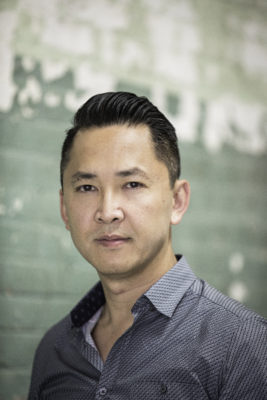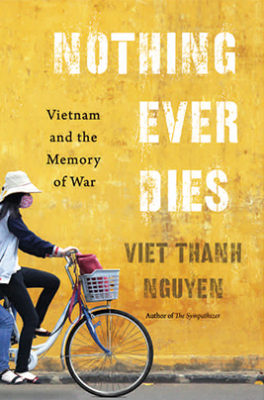Viet Thanh Nguyen discusses Nothing Ever Dies and the history of the Vietnam War in this interview for USC Dornsife.
USC Dornisfe’s Viet Thanh Nguyen delivers an acclaimed nonfiction work on the Vietnam War that raises questions about the ethics of memory as he explores how different countries remember the conflict.

In Nothing Ever Dies: Vietnam and the Memory of War (Harvard University Press, 2016), USC Dornsife’s Viet Thanh Nguyen says he wants readers to understand the gravity of war while remaining aware of possibilities for optimism.
Shortlisted for the National Book Award, Nguyen’s latest work is a searching exploration of the Vietnam War that provides a nonfiction counterpart to his Pulitzer Prize-winning novel, The Sympathizer (Grove Press, 2015).
“Nothing Ever Dies is a nonfiction companion that makes explicit many of the issues that are implicit in The Sympathizer,” said Nguyen, Aerol Arnold Chair of English and professor of English and American studies and ethnicity. “Nothing Ever Dies gives us a framework for how to think about justice, forgiveness and reconciliation that would be completely sentimental if I talked about it in The Sympathizer.”
Critically acclaimed by The New Yorker, Publishers Weekly, Kirkus, The Library Journal, and Booklist, the book tackles the way different countries have remembered the Vietnam War. Nguyen writes that “all wars are fought twice, the first time on the battlefield, the second time in memory … Memory is haunted, not just by ghostly others but by the horrors we have done, seen and condoned, or by the unspeakable things from which we have profited.”
The ethics of memory
Nguyen said he wanted the book to be about more than just how Americans and Vietnamese have remembered this particular war.
“This history has always been a preoccupation for me since I was a child,” Nguyen said. “I knew that this war had shaped my life and turned me into a refugee and brought me to the United States, so I wanted to do as comprehensive a study of our memories of this war as I could.” As he argues in his book, “memories are not simply images we experience as individuals, but are mass-produced fantasies we share with one another.”
He researched the book from 2002 to 2013, during which time he traveled to Vietnam, Laos, Cambodia and South Korea. He also wrote a series of articles that he says helped him to think through many of the difficult theoretical questions of the book.

“In Nothing Ever Dies, Viet has writtena deeply personal yet highly scholarly meditation on the ethics of memory, using America’s war in Vietnam as the crux of these often searing questions,” said David St. John, University Professor of English and Comparative Literature and chair of English. “Nothing Ever Dies has taken its place alongside Paul Fussell’s The Great War and Modern Memory as one of the finest books on the cultural history of war.”
Describing Nothing Ever Dies as a tour-de-force, Nayan Shah, professor of American studies and ethnicity and history,said the book is a moving, lyrically written exploration of the memory and forgetting of what the Vietnamese refer to as the American War.
“By exploring the psychic and social impact of the war trauma in literature, film, memorials and cemeteries, Professor Nguyen moves us away from being satisfied by the industrialization of memory to seek an ethics of remembering that neither excuses nor forgets proliferating modes of violence that cannot be easily memorialized,” said Shah, who is also chair of American studies and ethnicity. “He asks us to do more than empathize and remember our dead, but to recognize and remember how the inhuman inhabits the human.”
Leo Braudy, University Professor and Leo S. Bing Chair in English and American Literature and professor of English, art history and history, said Nguyen’s scholarly monograph is a wide-ranging and substantial addition to the discussion of memory — national, cultural and personal.
“Nguyen deftly weaves into his analysis his own experience, born in Vietnam but, as he says, made in America, himself the crucible within which the many forms of memory mix and try, or fail, to blend.”
A wider audience
Nguyen said he had wanted to ensure the book had an appeal beyond academe.
“It’s a serious, scholarly work, but I also wrote it for nonacademic, intelligent readers, and it seems to have been successful in that regard,” he said. “There are many people who are not scholars or critics who let me know that they found the book readable and meaningful.”
Nguyen said he was grateful to USC Dornsife for making it possible for him to take up fellowships and supporting him with a variety of grants while he was researching Nothing Ever Dies.
“This book took a very long time to come into being,” he said. “It was hard on me, but I’m glad USC Dornsife was patient.”
Describing Nothing Ever Dies as a passion project, Nguyen said, “I wrote the book in a way that moved me because I believed that I wouldn’t be able to move my reader unless I moved myself. I wanted to believe I could write a scholarly work that could be an emotional one as well and I think I was able to do that.”


